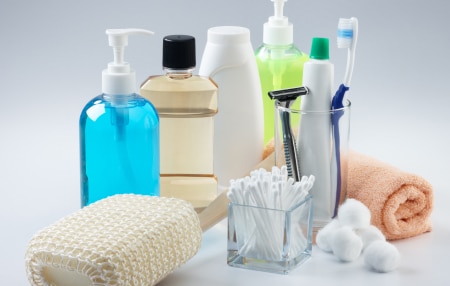
Open any bathroom cabinet and it’s usually jammed full of random products – sticky bottles, half-empty containers, tubs of gel, assorted sprays and more. Toiletries are everyday essentials, but they can also be expensive.
While no one is suggesting you give up on personal hygiene (not least for the sake of those around you), there are ways to cut costs and reduce unnecessary spending without compromising on cleanliness.
So, whether you’re looking to simply declutter your bathroom or slash your monthly budget, in this guide we take a look at where you can save money when it comes to toiletries without sacrificing any of the bare necessities. This will include a list of our top cost-cutting tips, as well as an overview of how professional debt management support can help in easing the strain if you’re struggling financially.
8 ways to save money on toiletries
1. Waste not, want not
Before you buy anything new, make sure you’ve used up the products you already own. Those half-empty bottles of shampoo, moisturisers and old toothpaste tubes are taking up space and costing you money. So remember, even if that old bottle of tropical shower gel doesn’t quite hit the mark, it’s still effective. Use it up before replacing it!
2. Use less
You don’t need a handful of shampoo to clean your hair and you certainly don’t need to wash it twice. That’s a myth, spun by the makers of hair care products. The less bubbles you have, the kinder you’re treating your hair. The same can also be true for other products, too. From toothpaste to dental floss, moisturiser to hand soap, only use what you need. Using less product means your toiletries last longer and you save money in the long run.
3. Consider switching brands
Put simply, lose the loyalty! Try downgrading to less expensive brands – you might be surprised by the quality. Start with one product at a time, like switching from a high-end shampoo to a budget-friendly alternative. If you like it, do the same with other products, like toothpaste and soaps. For inspiration, see Who What Wear’s Cheap Shampoos guide.
4. Always grab free samples
Never underestimate the power of freebies! Whenever you visit the dentist, hotel or beauty counter, don’t hesitate to ask for free samples. Whether it’s toothpaste, skincare products or shampoo, stocking up on free samples can cut costs significantly.
5. Buy in bulk to save
As a rule, toiletries tend to be cheaper if you buy larger quantities or family packs. Think shampoo, conditioner, shower gel and hand soap. If you’re really taking this seriously, check the per-unit price when comparing brands and sizes.
6. Look for online discounts and coupons
Look for online discounts, sign up for emails and get introductory discounts. Don’t be embarrassed about using money-off vouchers – they’re there to be used. Also, keep an eye out for multibuy discounts and coupon deals to help further reduce costs.
7. Opt for multi-use products
Buying products that can serve more than one function can be a great way to cut down costs. For instance, a simple bar of soap can replace body wash, face wash and even shaving foam in a pinch, while coconut oil can double up as a moisturiser and even a natural makeup remover. Similarly, Aloe Vera gel can be used as a moisturiser, an after-sun treatment and to soothe irritated skin or small cuts.
8. Make your own products
We’ve saved this one till last as we knew you’d seize this idea with unabated enthusiasm. But hear us out. Making your own toiletries is a fun and affordable way to refresh your bathroom routine. Try baking soda for your teeth, vinegar for your hair, coconut oil for your body. There are plenty of guides online to help you such as True Food’s Homemade Toiletries.
Staying on top of your household finances…
If saving on toiletries is part of a bigger picture to manage your finances, MoneyPlus can help you stay on top of your spending and control your budget. Small savings here and there can add up, especially when paired with smart financial advice, and by cutting costs in areas like toiletries and learning how to make your money work harder, you can feel more in control of your finances.
One good way to stay in control of your finances is by setting a budget for everyday essentials like toiletries and tracking your expenses over time. This will help you to gain clarity on where your money is going and how much you’re spending. You’ll soon see that small changes, like switching brands or using less, can make a noticeable difference.
Can debt management help you save on everyday costs?
When you’re living with significant debt, small savings can make a big difference. However, they are not always enough to get your financial situation back under control. That’s where debt management solutions come in.
Depending on your circumstances, solutions such as Individual Voluntary Arrangements (IVAs) and Debt Management Plans (DMPs) have the ability to restructure your repayments, making them more manageable, and in some situations they can write off debts completely.
At MoneyPlus, we offer both personalised Debt Management Plans and formal IVAs that are designed to help you regain control of your finances.
If cutting back through budgeting is not enough, and you want to find out more, visit MoneyHelper for free advice. Alternatively, you can speak with one of our expert advisors. Here at MoneyPlus, we offer specialist guidance on debt management, helping you to take control of your finances and build a healthier relationship with money.

To discover more about how to manage your debt and to receive free debt advice, you can visit www.moneyhelper.org.uk.

